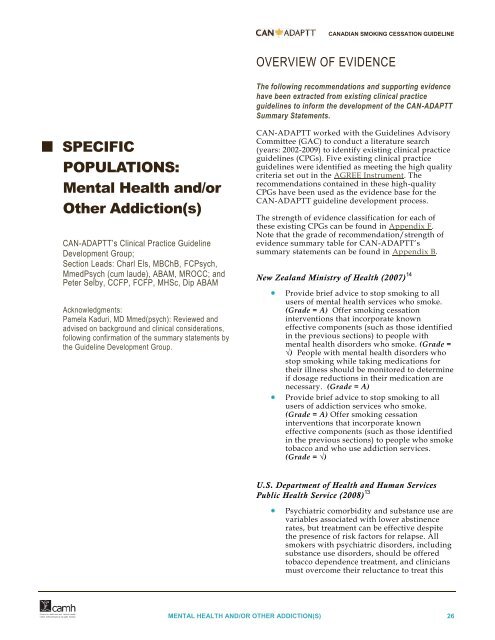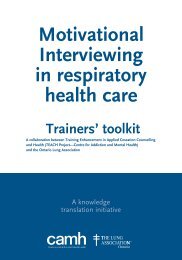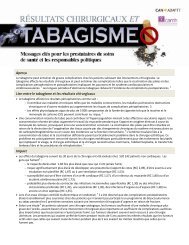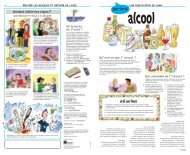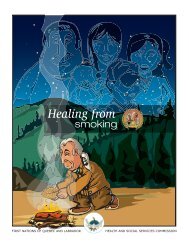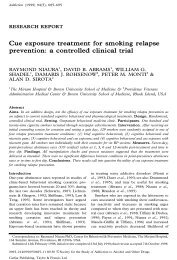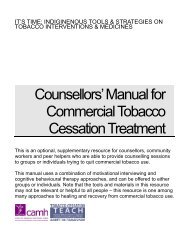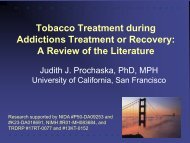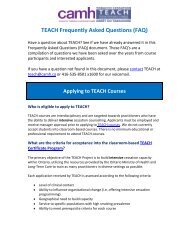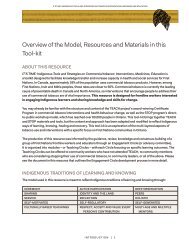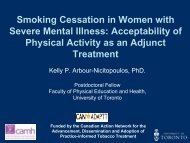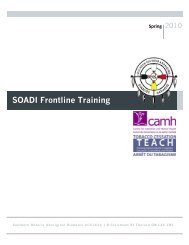Canadian Smoking Cessation Clinical Practice Guideline
Canadian Smoking Cessation Clinical Practice Guideline
Canadian Smoking Cessation Clinical Practice Guideline
You also want an ePaper? Increase the reach of your titles
YUMPU automatically turns print PDFs into web optimized ePapers that Google loves.
CANADIAN SMOKING CESSATION GUIDELINEOVERVIEW OF EVIDENCEThe following recommendations and supporting evidencehave been extracted from existing clinical practiceguidelines to inform the development of the CAN-ADAPTTSummary Statements.• SPECIFICPOPULATIONS:Mental Health and/orOther Addiction(s)CAN-ADAPTT’s <strong>Clinical</strong> <strong>Practice</strong> <strong>Guideline</strong>Development Group;Section Leads: Charl Els, MBChB, FCPsych,MmedPsych (cum laude), ABAM, MROCC; andPeter Selby, CCFP, FCFP, MHSc, Dip ABAMAcknowledgments:Pamela Kaduri, MD Mmed(psych): Reviewed andadvised on background and clinical considerations,following confirmation of the summary statements bythe <strong>Guideline</strong> Development Group.CAN-ADAPTT worked with the <strong>Guideline</strong>s AdvisoryCommittee (GAC) to conduct a literature search(years: 2002-2009) to identify existing clinical practiceguidelines (CPGs). Five existing clinical practiceguidelines were identified as meeting the high qualitycriteria set out in the AGREE Instrument. Therecommendations contained in these high-qualityCPGs have been used as the evidence base for theCAN-ADAPTT guideline development process.The strength of evidence classification for each ofthese existing CPGs can be found in Appendix F.Note that the grade of recommendation/strength ofevidence summary table for CAN-ADAPTT’ssummary statements can be found in Appendix B.New Zealand Ministry of Health (2007) 14Provide brief advice to stop smoking to allusers of mental health services who smoke.(Grade = A) Offer smoking cessationinterventions that incorporate knowneffective components (such as those identifiedin the previous sections) to people withmental health disorders who smoke. (Grade =√) People with mental health disorders whostop smoking while taking medications fortheir illness should be monitored to determineif dosage reductions in their medication arenecessary. (Grade = A)Provide brief advice to stop smoking to allusers of addiction services who smoke.(Grade = A) Offer smoking cessationinterventions that incorporate knowneffective components (such as those identifiedin the previous sections) to people who smoketobacco and who use addiction services.(Grade = √)U.S. Department of Health and Human ServicesPublic Health Service (2008) 13Psychiatric comorbidity and substance use arevariables associated with lower abstinencerates, but treatment can be effective despitethe presence of risk factors for relapse. Allsmokers with psychiatric disorders, includingsubstance use disorders, should be offeredtobacco dependence treatment, and cliniciansmust overcome their reluctance to treat thisMENTAL HEALTH AND/OR OTHER ADDICTION(S) 26


